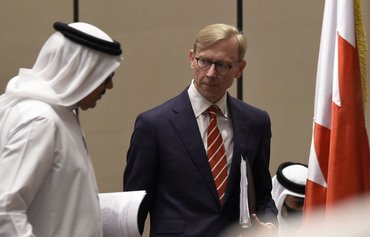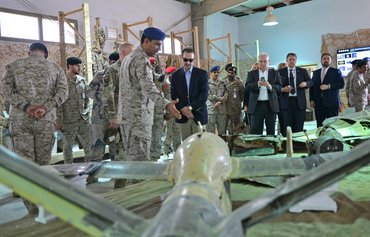Yemen's government has urged the international community to take a firm stance against Iranian actions that aim to undermine security in the region through the Houthis (Ansarallah) and other proxy groups.
Following a meeting headed by Prime Minister Moeen Abdulmalik on Thursday (December 5th) in the provisional capital Aden, the government said the Iranian regime "has crossed all red lines and become a tool for spreading terrorism, chaos, and instability in the region".
It condemned the regime's continued violations of binding UN resolutions and its arming of the Houthis with small arms and missiles.
The US on Thursday announced it had seized a major shipment of Iranian missiles bound for the Houthis, denouncing what it called a violation of a UN arms embargo.
A US warship interdicted the ship on November 25th off the cost of Yemen and found "sophisticated weapons" of Iranian origin including land-based, anti-tank and air-defense missiles, said Brian Hook, the US special representative on Iran.
"This discovery is yet more proof of Iran's efforts to inflame conflicts in the region by proliferating deadly weapons to its proxies," Hook said.
"It is also further evidence of how Iran repeatedly violates the UN arms embargo, which has been in place for over a decade," he said, referring to a 2007 Security Council ban on Tehran's weapons exports.
In its statement, the Yemeni government also lashed out at Iran's expansionist agenda in the region, and called for "stopping Iran's practices which will only be deterred by a firm, robust stance from the international community".
"There will be no peace in Yemen as long as Iran still insists on its aggressive, extortive behaviour against the world through its subversive proxies," it said.
Iran uses the Houthis "to serve its dangerous agenda which targets the stability and security of Gulf states, the region and international navigation in the Red Sea and Bab el-Mandeb", it added.
Thwarting peace efforts
"As Yemenis, we must overcome our differences and put our country's interests above all else in order to compel other [states] to help us," Yemeni diplomat Abdul Wahab Tawaf told Al-Mashareq.
"With its continued destructive terrorist policies, Iran is threatening Yemen's present and future and is derailing Saudi Arabia's efforts to reinstate Yemen's legitimate government," he said.
"Iran would certainly increase its supplies of sophisticated weapons to the Houthis at this time" to thwart peace efforts, Abaad Centre for Strategic Studies director Abdulsalam Mohammed told Al-Mashareq.
This is mainly because Iran seeks to keep the Houthis under its control and undermine any move by them towards peace in Yemen until the Iranian regime's tactical goals are realised, he said.
Some of these goals include lifting the sanctions on Iran and allowing it to re-export its oil, he added.
Iran should end its involvement, Hook said, pointing to the opening of dialogue between the Saudis and Houthis.
"Iran clearly does not speak for the Houthis nor have the best interests of the Yemeni people at heart," he said.
Hook also announced that the State Department was offering a $15 million reward for information on Abdul Reza Shahlai, a senior officer of Iran's elite Quds Force who is allegedly operating from Yemen.
He has already faced US sanctions over a purported plot to kill the Saudi ambassador in Washington.

![Arab coalition spokesman Turki al-Malki shows US Assistant Secretary of Near Eastern Affairs David Schenker reportedly Iranian weapons seized by Saudi forces from Yemen's Houthis, during a visit to a military base in al-Kharj in central Saudi Arabia, on September 5th. [Fayez Nureldine/AFP]](/cnmi_am/images/2019/12/06/21277-yemen-houthi-weapons-600_384.jpg)





